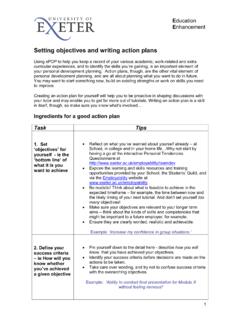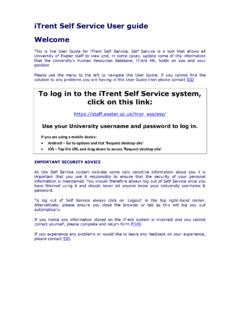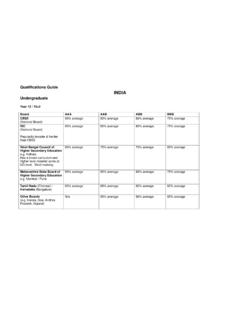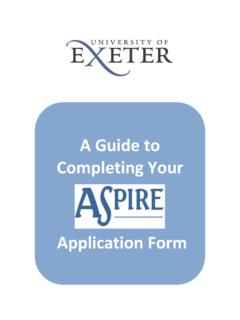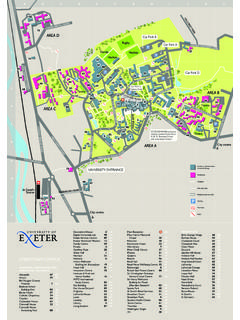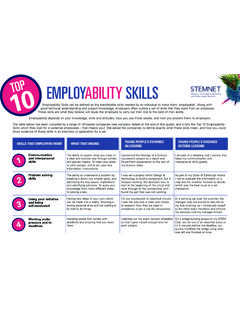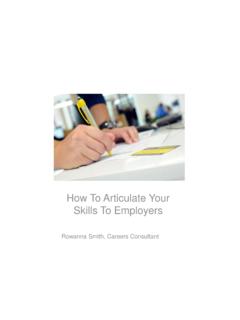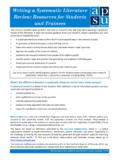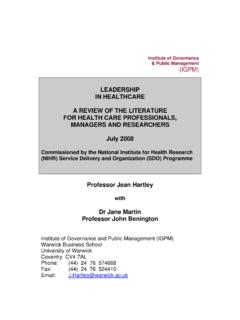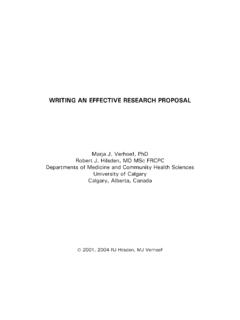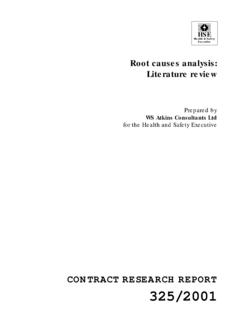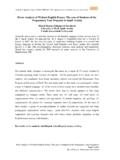Transcription of Reflective Writing - Home | University of Exeter
1 Reflective Writing Guidance Notes for Students Pete Watton Jane Collings Jenny Moon April 2001 2 Contents Aims and Objectives Page 3 Using the Guidance Notes Page 3 What is Required in Reflective Writing Page 4 Deepening Reflection Page 5 Exercise in Reflective Writing -1 Page 6 Multiple Perspectives in Reflective Writing Page 10 Possible Sources of Evidence for Reflection Page 11 Exercise in Reflective Writing 2 Page 12 Practising Reflective Writing Page 17 References Page 17 Bibliography Page 18-19 Web Sites Page 19 Pack Evaluation Page 20 3 Aims and Objectives Aim To inform and support the production of Reflective Writing for work-based learning or work experience modules.
2 Objectives - Having worked through the pack you will have: Identified the characteristics of Reflective Writing Recognise how to deepen Reflective writng Be able to start Writing reflectively Locate resources to support your Reflective Writing Using the Guidance Notes This pack is intended for your use, so you should feel free to write in it and customise it as you see fit. The pack provides both background information, exercises to complete and reference material for further research. Introducing Reflection There is increasingly much academic Writing about the benefits of reflecting on practice for everyone involved in education. An excellent description of reflection can be found in the Harry Potter novel The Goblet of Fire.
3 In the paragraph below Dumbledore the chief wizard and head teacher is talking to Harry about having excess thoughts! Harry stared at the stone basin. The contents had returned to their original, silvery white state, swirling and rippling beneath his gaze. What is it? Harry asked shakily. This? It is called a Pensieve, said Dumbledore. I sometimes find, and I am sure you know the feeling, that I simply have too many thoughts and memories crammed into my mind. Err, said Harry who couldn t truthfully say that he had ever felt anything of the sort. At these times said Dumbledore, indicating the stone basin, I use the Penseive. One simply siphons the excess thoughts from one s mind, pours them into a basin, and examines them at one s leisure.
4 It becomes easier to spot patterns and links, you understand, when they are in this form. ( Rowling 2000) 4 What is Required in Reflective Writing ? Why Reflect? It is not sufficient simply to have an experience in order to learn. Without reflecting upon this experience it may quickly be forgotten, or its learning potential lost. It is from the feelings and thoughts emerging from this reflection that generalisations or concepts can be generated. And it is generalisations that allow new situations to be tackled effectively. (Gibbs 1988) Reflective Writing provides an opportunity for you to gain further insights from your work through deeper reflection on your experiences, and through further consideration of other perspectives from people and theory.
5 Through reflection we can we can deepen the learning from work. The Nature and Content of Reflection So what do we mean by reflection? One tentative definition of reflection is offered by Moon (1999): .. a form of mental processing with a purpose and/or anticipated outcome that is applied to relatively complex or unstructured ideas for which there is not an obvious solution . (Moon 1999 pp23) She continues by outlining some of the purposes for reflection: We reflect in order to: Consider the process of our own learning a process of metacognition Critically review something - our own behaviour, that of others or the product of behaviour ( an essay, book, painting etc.) Build theory from observations: we draw theory from generalisations - sometimes in practical situations, sometimes in thoughts or a mixture of the two Engage in personal or self development Make decisions or resolve uncertainty.
6 Empower or emancipate ourselves as individuals (and then it is close to self-development) or to empower/emancipate ourselves within the context of our social groups. (Ibid pp23) In this instance, whilst your Reflective Writing must relate to your work place experience, the exact focus and emphasis is for you to determine. Deepening Reflection Three Models of reflection 5 When assessing your Reflective Writing your tutor will be expecting more than a superficial review of your experience, they will be seeking evidence of deeper reflection. This means moving beyond the descriptive, and subjecting your experience to greater scrutiny. In Learning by Doing, Gibbs (1988) outlines the stages for a Structured Debriefing , which are based on Kolb s (1984) Experiential Learning Cycle and which encourage deeper reflection: Description: What is the stimulant for reflection?
7 ( incident, event, theoretical idea ) What are you going to reflect on? Feelings: What were your reactions and feelings? Evaluation: What was good and bad about the experience? Make value judgements. Analysis: What sense can you make of the situation? Bring in ideas from outside the experience to help you. What was really going on? Conclusions (general): What can be concluded, in a general sense, from these experiences and the analyses you have undertaken? Conclusions (specific): What can be concluded about your own specific, unique, personal situation or ways of working? Personal Action plans: What are you going to do differently in this type of situation next time? What steps are you going to take on the basis of what you have learnt?
8 Hatton and Smith ( 1995) identified four levels in the development of teacher reflection from teaching practice. In your Reflective Writing your tutor will be looking for evidence of reflecting at the higher levels. Descriptive Writing : This is a description of events or literature reports. There is no discussion beyond description. The Writing is considered not to show evidence of reflection Descriptive Reflective : There is basically description of events, but shows some evidence of deeper consideration in relatively descriptive language. There is no real evidence of the notion of alternative viewpoints in use. Dialogic reflection: This Writing suggests there is a stepping back from the events and actions which leads to different level of discourse.
9 There is a sense of mulling about , discourse with self and an exploration of the role of self in events and actions. There is consideration of the qualities of judgements and possible alternatives for explaining and hypothesising. The reflection is analytical or integrative, linking factors and perspectives. Critical reflection: This form of reflection, in addition, shows evidence that the learner is aware that actions and events may be located within and explicable by multiple perspectives, but are located in and influenced by multiple and socio political contexts 6 Bloom (1964) identified different levels of thinking processes, which he presented in a hierarchy (figure 1); these can also be used as a framework for more thorough reflection.
10 They move from knowing, evidenced through recalling information, through to evaluating, evidenced through making systematic judgements of value. In your Reflective Writing your tutor will be looking for evidence of these higher level processes. Process Explanation Knowledge Recognition and recall of information - describing events Comprehension Interprets, translates or summarises given information - demonstrating understanding of events Application Uses information in a situation different from original learning context - Analysis Separates wholes into parts until relationships are clear breaks down experiences Synthesis Combines elements to form new entity from the original one - draws on experience and other evidence to suggest new insights Increasing Difficulty Evaluation Involves acts of decision making.
